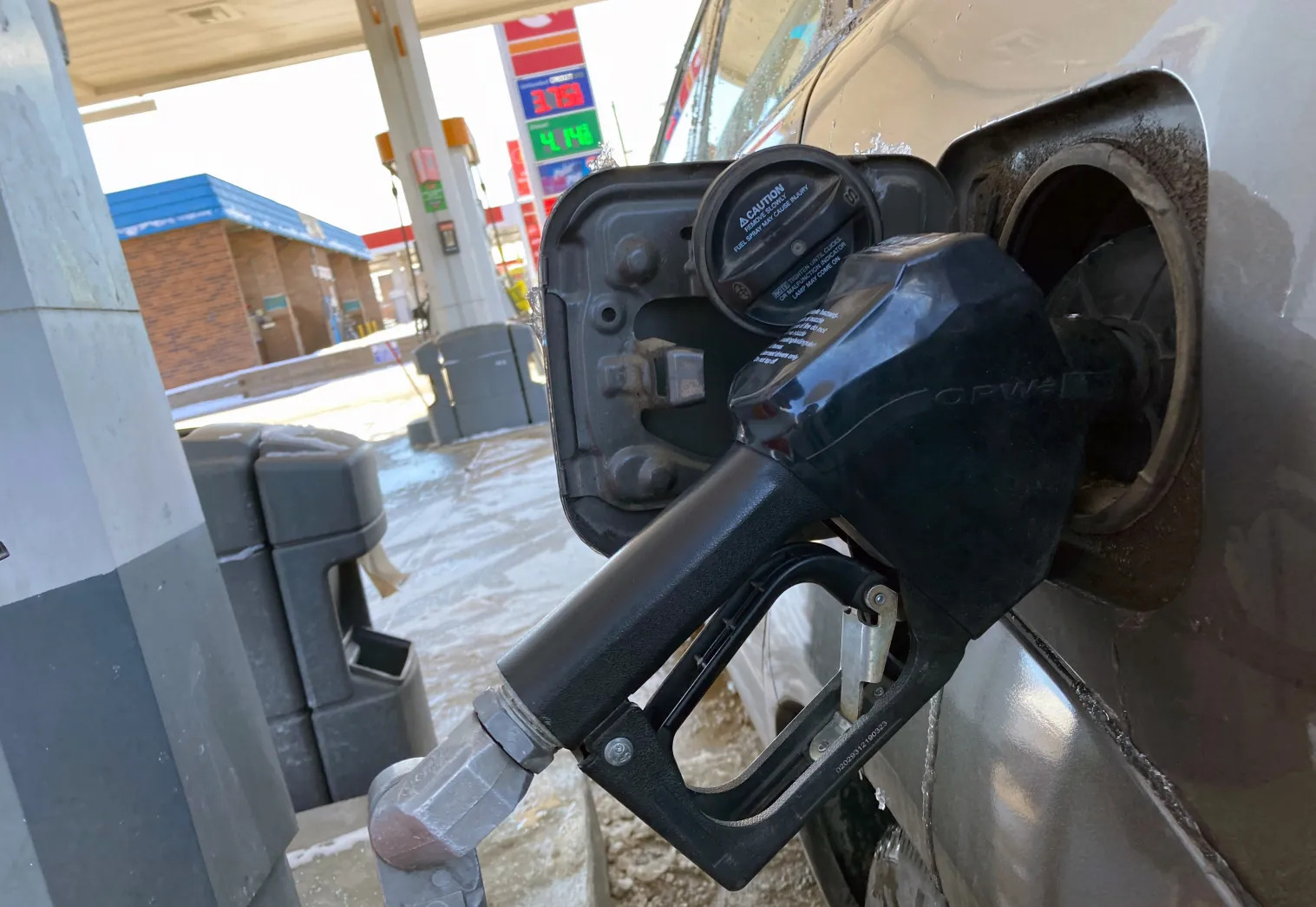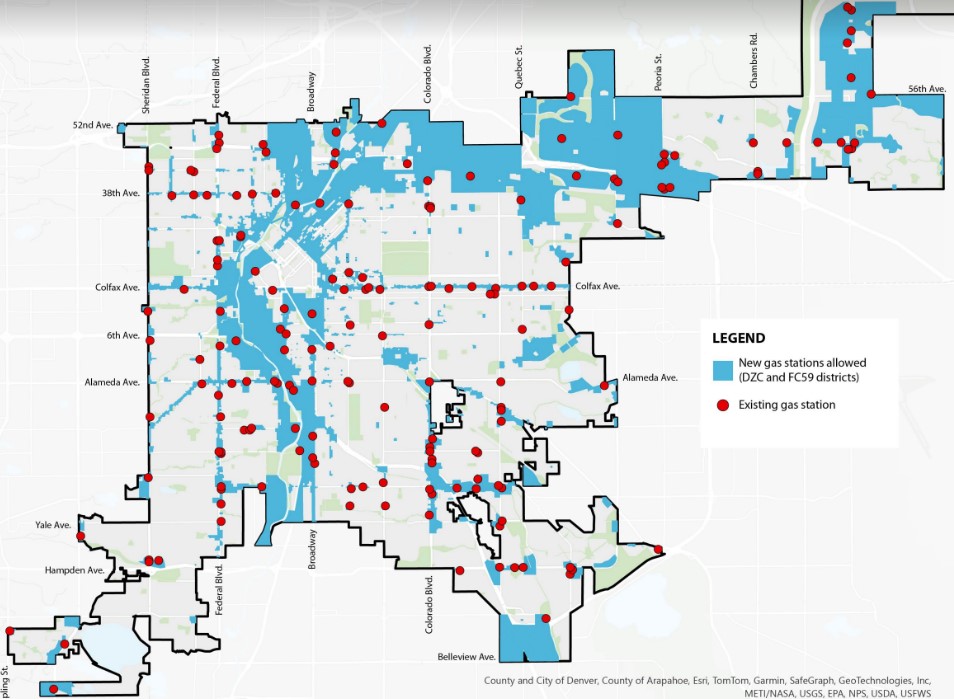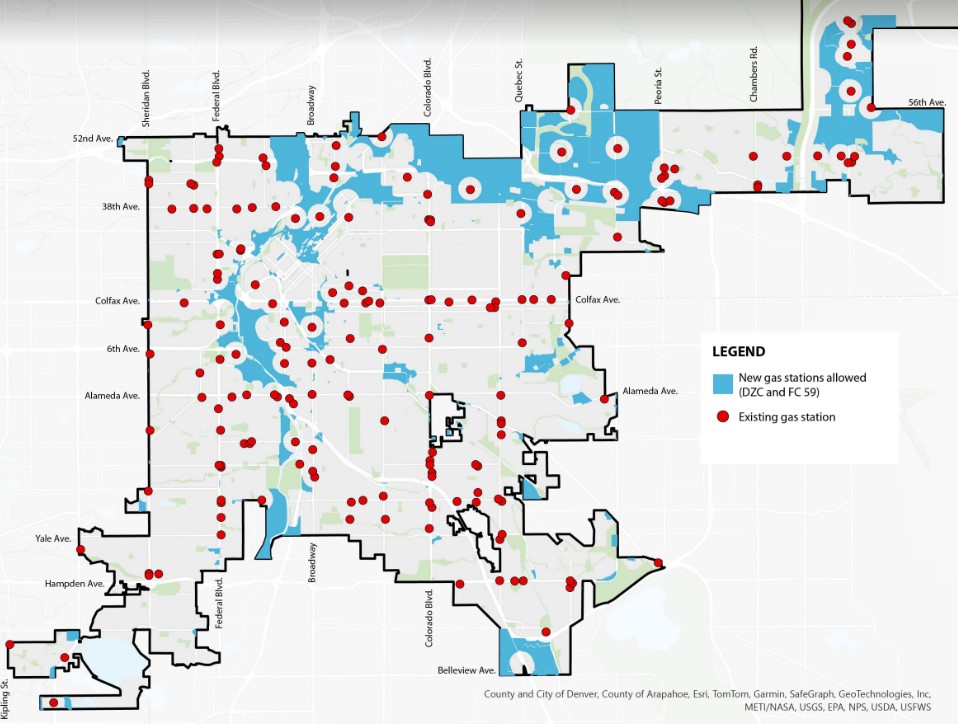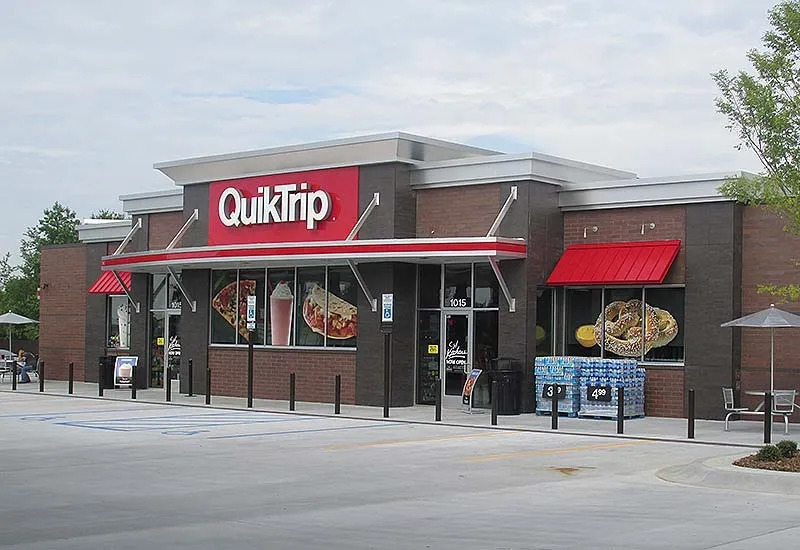
A motorist fills a vehicle with gasoline at a pump at a gas station near 35th Avenue and Colorado Boulevard in Denver on March 7, 2022. (Patrick Traylor/The Denver Post)
One chain has emerged at the center of Denver’s debate over whether to place new restrictions on gas station development ahead of a vote Tuesday.
While more than 100 of people have commented on the measure pro and con, Tulsa, Oklahoma-based QuikTrip is the only chain that has submitted feedback on company letterhead.
“While we agree with many of the goals behind this proposal, we are deeply concerned that the current draft will create more problems than it solves,” the company wrote Dec. 18.
QuikTrip voiced concerns about the measure’s retroactive effective date. If passed, it would ban new gas stations in many areas, unless they were proposed before May 13 of last year. QuikTrip has submitted multiple proposals for new stations since that date.
An influential real estate trade group has joined the company in objecting to the retroactive element, arguing it is unconstitutional.
But QuikTrip is also on the mind of those who support gas station restrictions. Many of the comments Denver has received in recent weeks specifically oppose a QuikTrip station proposed just off the Interstate 25-Yale Avenue interchange.
“I oppose the building of a gas station at 5500 Yale, it is a residential area, there is a transit station right there and it is bad for the environment,” wrote Katherine Regan, who indicated she lives nearby.
Quarter-mile buffer from existing stations
The proposed measure was introduced last year by three City Council members: Amanda Sawyer, Diana Romero Campbell and Paul Kashmann.
The three are asking their colleagues to approve a zoning code amendment that would prohibit new gas stations within a quarter-mile of an existing one, as well as within a quarter-mile of rail transit platforms.
The amendment also would prohibit new stations within 300 feet of lower-intensity residential zone districts, such as those dominated by single-family homes.
The measure would allow the city to waive the above restrictions for gas stations accompanying a full-service grocery store.
An August presentation to Denver’s Planning Board included two maps. The first showed, in blue, where zoning currently allows gas stations to be built. The outline of some of the city’s main corridors — such as Colfax, Federal and Broadway — can easily be seen.

Where gas stations can currently be built. (City of Denver)
The second map showed, again in blue, where gas stations could be built if the new restrictions are implemented.

Where gas stations could be built if zoning changes pass. (City of Denver)
Colfax, Federal and Broadway disappear on the second map. There would also be few opportunities to build a new station along Colorado Boulevard, although that highway already has relatively few suitable sites — and part of it is bordered by Glendale.
Existing gas stations are shown as red dots on both maps.
Kashmann said in August that the change is about prioritizing the development of housing as well as “placemaking.” He also cited “environmental and noise” reasons for establishing a buffer between gas stations and residential districts.
“I have never had a question as to someone being unable to conveniently fill their tank, so I think we need, as a landlocked city, to be as prudent as possible with how we meet our needs,” he said.
The council will vote on the measure Tuesday evening after a public comment period.
NAIOP: ‘Significant constitutional concerns’
A representative of NAIOP Colorado, the real estate trade group, sent a letter to the council last month focusing on the retroactive nature of the measure.
Tyler Carlson, the organization’s public policy chair and an executive with local development firm Evergreen DevCo, wrote to express “significant constitutional concerns.”
“The Colorado Supreme Court has already addressed this very issue, ruling that zoning ordinances cannot legally set an effective date prior to their adoption,” he wrote. “Applicants who submit building permits under the existing legal framework are entitled to have those applications evaluated based on the laws in force at the time of submission.”
While Carlson’s letter focused on the retroactivity, NAIOP Colorado Executive Director Kathie Barstnar said the organization also doesn’t believe the measure is good policy for other reasons.
She questioned why Denver would seek to limit competition, noting that it’s common to see multiple gas stations at the same intersection.
“Inevitably, those will be the ones that have the lowest gas prices,” Barstnar said.
Barstnar also said the measure could limit food options in neighborhoods, as newer gas stations often incorporate hot food items and grocery staples. And in general, she said, more regulations “would continue to put a damper on the ability of people to invest and want to do more commercial real estate activity here.”
If Denver leaders want to encourage more housing, Barstnar said, they should argue for changes to state laws regarding construction defects. Concerns about lawsuits have left many developers unwilling to build condominiums locally — and that’s “an entire wedge of the housing market,” she said.
NAIOP Colorado has shown a willingness to go to court. It and other real estate groups have a pending lawsuit against the city over regulations reducing energy use in large buildings, known as Energize Denver.
Asked if NAIOP would be willing to sue over the gas station measure, Barstnar said the organization had not discussed that — but added that someone likely would unless it’s changed or rejected.
“I would assume if it passes in the form it’s in, someone would challenge it,” she said.

A rendering of QuikTrip’s smaller footprint site. (Courtesy QuikTrip via The Denver Post)
Broker: ‘Seven deals in Denver that would die’
Mike Quinlan, a real estate broker and principal with NavPoint Real Estate Group, said he knows of several situations where plans for a gas station were submitted after May 13 for a site where the measure would prohibit it.
“To my knowledge there are seven deals in Denver that would die. … There’s one (company) that will have four deals die,” Quinlan said.
That company is QuikTrip. Jessica Glavas, a local executive with the company, wrote in a January letter — one of two she authored — that the chain had four projects in the works that would be affected.
“QuikTrip has invested an estimated $500,000 in engineering, design and other due diligence costs in submitting their 4 applications that are now at risk,” she wrote.
The May 13 date was chosen because that day was the first time a council committee discussed possible gas station regulation. But Glavas noted that the idea was very preliminary at the time, and specifics like the quarter-mile buffer had yet to be hammered out.
“An applicant could not have reasonably known at that time if their proposal would meet speculative future regulations or not – or even if/when regulation might move forward,” she wrote.
Glavas wrote in an earlier letter that state records show Denver has 206 active gas stations installed, on average, 27 years ago. She said the proposed measure would protect “outdated” stations with more leak-prone tanks.
But the industry isn’t completely against the measure. In its own letter, the Colorado Wyoming Petroleum Marketers Association praised “the hard work the sponsors have spent in engaging our group,” although it did suggest that some accommodations be made for the relocation of an existing station.
“This is a proposal where even four years ago we would have likely opposed as government overreach and a restriction on competition and anti-consumer … . While not unanimously, the Association’s Denver retailers and members think this is a good path forward and would urge your support,” Executive Director Grier Bailey wrote.
QuikTrip has been in expansion mode
QuikTrip announced its intent to enter the Denver market in 2019.
The company operates a dozen gas stations locally, according to its website. But that’s intended to be just the start. Television station Denver7 previously reported QuikTrip was targeting 50 to 70 stores locally.
One site where QuikTrip wants to build is 1595 W. 48th Ave., northeast of the Interstate 70-Pecos Street interchange. The company submitted a concept plan for the site in July — two months after the critical May date.
In a comment submitted to Denver, Vangie Pappas identified herself as an owner of the property and said she’d been working with the prospective buyer since January 2024. She said passage of the measure would be “catastrophic” to her.
“As a part of my negotiations, I am to sell my property with as little lease term in place and will lose my largest tenant because of that. If this ordinance passes, not only will you cause my Buyer and my expected retirement to go away, my largest income producing tenant will be vacating,” Pappas wrote.
QuikTrip also wants to build at 5500 E. Yale Ave., where an older office building sits. It’s owned by Jerry Glick’s Columbia Group. It’s not within a quarter-mile of other gas stations. But it is a short walk from an RTD rail stop.
Multiple files of public comments about the measure can be found on the city’s website.
“I’ve been way more annoyed and concerned about the number and density of pot shops than I am gas stations,” one person wrote.
“I think all new gas stations should be required to add EV charging stations also,” said another.
Dozens of comments in recent weeks object to a gas station at the Yale site, often without addressing any other aspect of the proposal.
“The sidewalks in the area are already very narrow and I don’t feel safe riding my bike on Yale. A gas station will exasperate this issue and I would rather create more safety for pedestrians than build gas stations,” wrote Briana Wilberding Brannigan, identifying herself as a nearby homeowner.
Those living near 5500 E. Yale previously pushed back against Glick’s 2023 plan to let Denver Mayor Mike Johnston’s administration establish a homeless “micro-community” on the existing building’s parking lot. The city ultimately didn’t move forward with it.
Editor’s note: This story has been updated to better reflect the number of comments in recent weeks.

